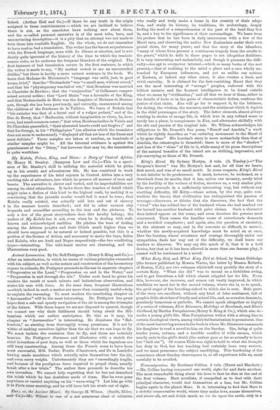Animal Locomotion. By Dr. Bell Pettigrew. (Henry S. King and
Co.)— After an introduction, in which he treats of various principles connected with his subject, as well as the nature and construction of the locomotory organs in animals, Dr. Pettigrew proceeds to discuss in separate chapters "Progression on the Land," "Progression on and in the Water," and "Progression in and through the Air." Under each head he gives his readers the result of much minute and industrious observation, and states his case with force. At the same time, frequent illustrations —which indeed in such a matter are more than commonly useful—help to explain the reasoning. To most readers the concluding chapter on "Aeronautics" will be the most interesting. Dr. Pettigrew has great hopes that a safe and speedy navigation of the air is among the triumphs of the future. With these hopes we are not disposed to quarrel, though we cannot see why their- fulfilment should bring abotit the Mil- lennium which our author anticipates. Be this as it may, his chapter on "Aeronautics" is interesting. He dismisses the "Bal- loonists," as starting from thoroughly wrong premisses. It is not by virtue of making ourselves lighter than the air that we can hope to fly. We must imitate the creatures that do fly, and these are certainly heavier. Dr. Pettigrew discusses and illustrates with a sketch the chief inventions of past days, as well as those which the ingenious are still busy constructing. Among these the French seem to have been most successful, MM. Nadar, Pontin d'Amecourt, and De la Landelle having made machines which actually raise themselves into the air, and even carry weight. Unfortunately they are "exceedingly fragile, and because of the prodigious force required to propel them, usually break after a few trials." The author then proceeds to describe his own invention. We cannot help regretting that he has not described the trials which he has doubtless made of them. Has he ever gone anywhere or carried anything on his "wave-wing"? Let him go with it to Paris some morning, and he will have left his rivals out of sight.


































 Previous page
Previous page